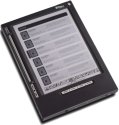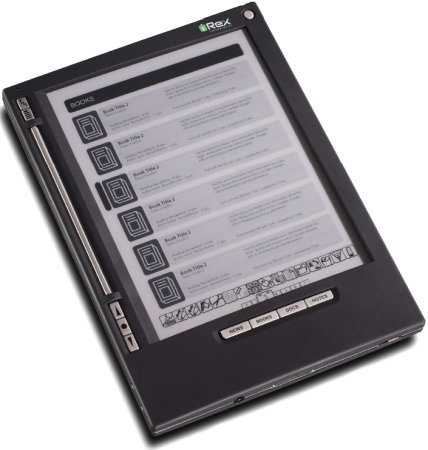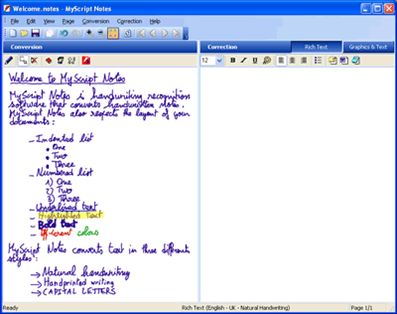Device Profile: iRex iLiad mobile eBook reader
Aug 25, 2006 — by LinuxDevices Staff — from the LinuxDevices Archive — 9 views iRex used Linux and an electronic paper display (EPD) to build a portable reading device available now for personal and business-to-business applications. The iLiad's paper display “reads just like paper, and is perceived as such by the human eye,” the company says.
iRex used Linux and an electronic paper display (EPD) to build a portable reading device available now for personal and business-to-business applications. The iLiad's paper display “reads just like paper, and is perceived as such by the human eye,” the company says.

The iLiad's EPD is “perceived as paper,” iRex says
iRex is currently marketing the iLiad primarily in “business-to-business” applications, offering to customize the device to support various formats and uses. However, the iLiad is also available for retail sales, direct from iRex's online store, priced at 650 Euros.
digg this story |
iRex says that in the hands of school children, iLiad can replace stacks of weighty text books, and in the briefcases of doctors, lawyers, and mechanics, it could easily carry voluminous reference libraries. Newspaper, magazine, and book publishers, meanwhile, might use the device to reduce printing and shipping costs, and to reach new markets, iRex suggests.
The iLiad has both wired and wireless networking interfaces. Additionally, a CompactFlash port could be used to add additional networking capabilities, such as cellular modem cards. Thus, the iLiad could support a variety of electronic content distribution schemes.
The iLiad has a touchscreen display and stylus, allowing it to be used for note-taking and marginalia-scribbling, in addition to just reading. MyScript handwriting recognition software from VisionObjects, shown in the following screenshot, is available for the device, for forms-processing and other applications.

VisionObjects's MyScript Notes application
Supported formats include PDF, XHTML, TXT, APABI (China only), OEB (open eBook), and MP3, with support for additional formats available through iRex's customization services, according to iRex.
What's between the covers?
The iLiad is based on an Intel XScale processor, clocked at 400MHz. It has 64MB of RAM. It come standard with 128MB of free flash space — sufficient for “1 month of newspapers, 30 books, and many other documents,” iRex says.
The iLiad measures 8.5 x 6.1 x 0.6 inches (155 x 217 x 16 mm), and weighs 13.8 ounces (390 grams). Its 160 dpi monochromatic (16 shades of gray) SVGA (1024 x 768) EPD display measures 6.3 x 4.8 inches, and can be easily read indoors or out, iRex says.
Input/output ports and expansion interfaces include:
- USB type A connector for USB memory stick
- CF type II slot for memory application or “other applications,” presumably referring to Bluetooth cards and other CFIO peripherals
- MMC memory card slot
- 3.5-inch stereo audio out jack
- Integrated 802.11g WiFi
- 10/100 wired Ethernet LAN port
The iLiad comes with a rechargeable battery said to last up to a week, given three hours of reading per day.
The iLiad can operate between 0 and 90 degrees F (0 to 50 degree C), and can withstand storage temperatures from -36 to 126 degrees F (-20 to 70 degrees C).
On the software side, the iLiad runs a 2.4 Linux kernel, according to VisionObjects, which supplied the MyScript handwriting recognition software for the device.
Availability
The iLiad is available now, priced at 650 Euros, direct. The VisionObjects MyScript handwriting recognition software for the iLiad costs 60 Euros.
This article was originally published on LinuxDevices.com and has been donated to the open source community by QuinStreet Inc. Please visit LinuxToday.com for up-to-date news and articles about Linux and open source.